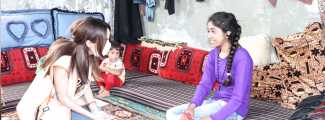UNHCR
Mon, 06/29/2020 - 10:55
Sessions for Women: “School Escort" - Aleppo and Rural Aleppo
Mon, 06/29/2020 - 10:52
“Distributing Food Baskets” Initiative – Jaramana, Rural Damascus
Sun, 06/28/2020 - 07:55
Sterilization Campaign at the Examination Centers - Adra Al-Balad, Rural Damascus
Sun, 06/28/2020 - 07:51
"My Duty Towards Myself and my Children" Activity – Qamishli, Hassakeh
Sun, 06/28/2020 - 07:46
Awareness Campaign on Child Labour - Hama
Sun, 06/28/2020 - 07:38
Awareness Campaign on Gender Discrimination - Baniyas, Tartous
Sun, 06/28/2020 - 07:35
Evaluation of the Cases of Children with Specific Needs - Tartous
Mon, 06/22/2020 - 11:10
“Success Steps” Activity for Preparatory Certificates Students – Rural Damascus
Mon, 06/22/2020 - 11:06

